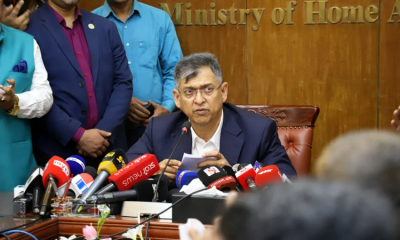As the community transmission of Covid-19 driven by the Omicron variant is going on in full swing across the country, public health experts warned that the uptrend in the virus infection may continue for two more weeks.
They also said the Covid positivity rate may hit a plateau in mid-February before a steep decline toward the end of the next month, reports.
As per official data, Bangladesh has been witnessing more than 30 percent infection rate for the last few days, but the experts believe the actual rate and number of infections is much higher than the government’s count since a huge number of virus-infected people remain untested.
Talking to UNB, public health experts Dr Abu Jamil Faisel, Dr Be-Nazir Ahmed, Dr Mushtuq Hussain, and MH Chowdhury Lenin advised the government to strictly enforce the Covid restrictions alongside forcing people to maintain health safety rules to slow down the transmission of the virus.
Covid reaching peak
Dr Leanin, chairman of the medicine department at the Health and Hope Hospital, said the country is seeing an exponential rise in the number of coronavirus cases, as the current Covid wave is going to reach its peak.
He said the declining phase in the third wave of the deadly coronavirus may begin from the third week of February. “The infection rate may decline sharply or slowly depending on how the preventive measures are being enforced,” the expert noted.
He said the country can conduct more than two lakh tests by using Rapid antigen kits. “But I don’t know why the number of such tests is still very low. So, many people are remaining out of Covid tests and we’re not getting the real picture of Covid transmission.”
“As we get a partial scenario of the Covid situation, our public health experts sometimes fail to give the exact projection,” Lenin observed.
Dr Faisel, a member of the Public Health Advisory Committee of Covid-19, said the Covid infections will show the uptrend until the second week of February. “The situation may improve at the end of the coming month.”
He, however, said many infected people are not undergoing tests. “So, the actual number of infected people is not reflected in the official count. The official reporting on Covid infection is only the tip of the iceberg. At least one or two lakh people are getting infected daily.”
Rural people’s vulnerability
Dr Faisel said the virus transmission will now continue to grow in different districts. “This virus may not leave anyone. It’s a matter of concern that many people in rural areas remain unvaccinated.”
He said people in rural areas are little concerned about undergoing Covid tests. “So, we won’t get the real picture of the Covid situation though the community transmission is going on in most districts.”
The expert said the situation has now reached such a level that community transmission cannot be stopped. “We should now focus on patient management. We should keep all our district hospitals ready to deal with Covid patients since the majority of people in rural areas still remain unvaccinated.”
He said people who still did not receive any dose of the vaccine are very vulnerable to the virus. “So, they should remain very alert. Besides, special attention should be given to the elderly people and those who have comorbidities as the death rate among these people is high.”
Restrictions only on papers
Dr Mushtuq Hussain, a consultant at the Institute of Epidemiology, Disease Control and Research (IEDCR), said though the Covid cases are growing alarmingly, people are still showing serious apathy to health safety rules.
He said the government also seems reluctant about enforcing laws to force people to maintain health protocols. “If it continues, I think, the current wave may linger for a longer period than our projection.”
Dr Faisel said most government restrictions are there only on papers, as there is no visible drive to enforce those properly. “People are still reluctant about wearing masks, avoiding mass gatherings.”
He said the government should strictly enforce all the restrictions to slow down Covid transmission.
Besides, the expert said, the vaccination drive should be intensified to bring the targeted population under its coverage as soon as possible.
Dr Be-Nazir Ahmed, an infectious disease expert, said the government is not serious about controlling the outbreak of the virus. “Though many restrictions have been imposed, everything is going on as usual. “The international trade fair, different elections, all social congregations are going on while shops and markets remain open.”
He said though the death rate is very low, every life has its value. “We should make all possible efforts to save lives and keep people protected from the virus infection.”
The expert said people should remain very careful for at least three more weeks. “They shouldn’t go outside without any urgent needs and avoid any gathering. “Health safety rules should be followed properly and no one should go outside without wearing masks.”
Another wave may roll in April
Dr Benzair thinks the third wave of Covid may come under control in the middle of March next, but another one to hit the country later.
“The government must remain alert as the country may see the surge of the virus during April again. We shouldn’t forget that we saw a serious spike in Covid cases during April over the last two years,” he warned.
He said it seems the coronavirus is unlikely to say goodbye anytime soon as more dangerous variants may emerge anytime. “We need to learn how to live with this virus.”











-20260223082704.webp)
-20260223074941.jpeg)
-20260223062301.jpg)





















